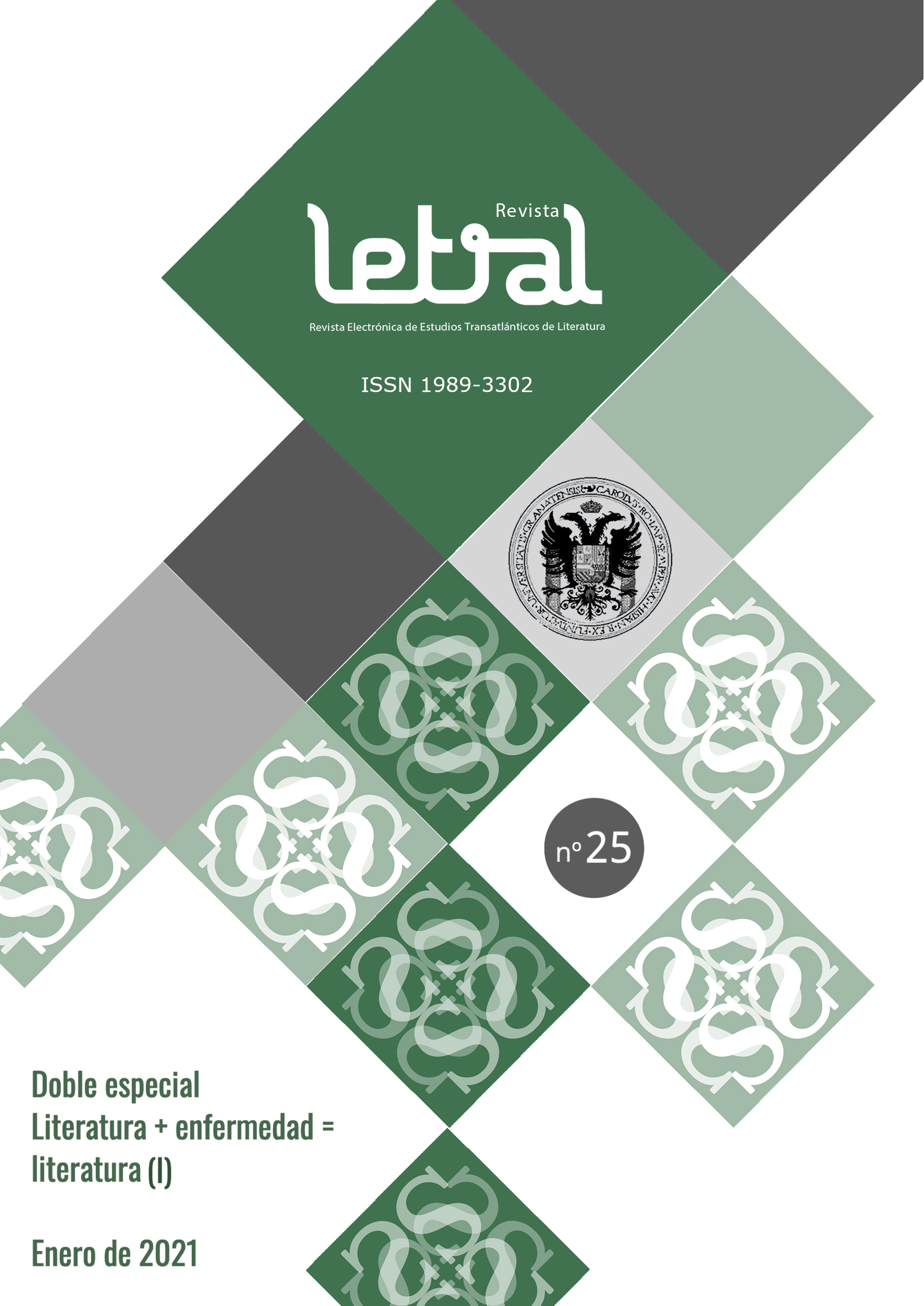Occupy Literature. Writing from the Fourth World
DOI:
https://doi.org/10.30827/rl.v0i25.17043Keywords:
Chilean narrative, Diamela Eltit, geopolitics, literature and disease, anticolonialismAbstract
My article analyzes the literary geopolitics of El cuarto mundo (1988), the third novel by Chilean writer Diamela Eltit. I approach the various operations that Eltit carries out –from the radicalization of disease to the transformation of the sick and monstrous body– as counter-offensives that reconcile the poles of the aesthetic-political vector. I read El cuarto mundo as a turn in Eltit’s poetics, one situated in a regional discussion that questions the role of literature and its politicity by going beyond allegory and the figuration of Chile as an aesthetic-political sign. I examine Eltit’s careful reading of the new global order and her understanding of literary authorship as an infirmity in the face of the ruling class’s abandonment of literary pursuits in recent decades.
Downloads
References
Barrientos, Mónica del Carmen. “El cuerpo femenino y transgresión en El cuarto mundo de Diamela Eltit”. Revista Iberoamericana, Vol. LXXXII, n.º 254, 2016, pp. 15-26.
Breckenridge, Janis. “Female (W)rites: Notions of Creativity in Diamela Eltit”. Romance Languages Annual XI, 2000, pp. 424-427.
Brito, Eugenia. Ficciones del muro: Brunet, Donoso, Eltit. Santiago, Cuarto Propio, 2014.
Cánovas, Rodrigo. “Diamela Eltit. Algunos años antes, algunos años después”. Rubí Carreño Bolívar (ed.). Diamela Eltit: redes locales, redes globales. Madrid-Frankfurt, Iberoamericana-Vervuert, 2009, pp. 13-21.
Carreño Bolívar, Rubí. “¿Qué eres? Una torpe, alerta, alarmada, pasafronteras”. Rubí Carreño Bolívar (ed.). Diamela Eltit: redes locales, redes globales. Madrid-Frankfurt, Iberoamericana-Vervuert, 2009, pp. 13-21.
Donoso, José. El obsceno pájaro de la noche. Madrid, Santillana, 1979.
Eltit, Diamela. “Colonizadas”. Nathalie Bouzaglo y Javier Guerrero (eds.). Excesos del cuerpo. Relatos de contagio y enfermedad en América Latina. Buenos Aires, Eterna Cadencia, 2009, pp. 79-94.
Eltit, Diamela. El Padre Mío. Santiago, Francisco Zegers editor, 1989.
Eltit, Diamela. Fuerzas especiales. Santiago, Editorial Planeta Chilena, 2013.
Eltit, Diamela. Impuesto a la carne. Santiago, Seix Barral, 2007.
Eltit, Diamela. Jamás el fuego nunca. Santiago, Seix Barral, 2011.
Eltit, Diamela. “Las aristas del congreso”. Carmen Berenguer, Eugenia Brito et al. (eds.). Escribir en los bordes. Santiago, Editorial Cuarto Propio, 1994, pp. 17-19.
Eltit, Diamela. “Las tramas del ‘boom’”. El País, 15 de noviembre de 2012. En: https://elpais.com/cultura/2012/11/15/actualidad/1352992510_280513.html
Eltit, Diamela. Lumpérica. Santiago, Ediciones del Ornitorrinco, 1983.
Eltit, Diamela. Mano de obra. Santiago, Editorial Planeta Chilena, 2002.
Eltit, Diamela. Réplicas: escritos sobre arte, literatura y política. Santiago, Seix Barral, 2016.
Eltit, Diamela. Sumar. Santiago, Seix Barral, 2018.
Eltit, Diamela y Paz Errázuriz. El infarto del alma. Santiago, Ocho Libros, 2010.
García Cedro, Gabriela. “La escritura como cuestionamiento al orden institucional en la narrativa de Diamela Eltit”. La torre, vol. X, n.º 38, 2005, pp. 439-449.
García Márquez, Gabriel. Cien años de soledad. Bogotá, Grupo Editorial Norma, 2004.
Green, Mary. Diamela Eltit: Reading the Mother. Woodbridge, Tamesis, 2007.
Goldman, Silvia. “Cuatro exégesis de El cuarto mundo”. Rubí Carreño Bolívar (ed.). Diamela Eltit: redes locales, redes globales. Madrid-Frankfurt, Iberoamericana-Vervuert, 2009, pp. 147-154.
Han, Byung-Chul. Psicopolítica: neoliberalismo y nuevas técnicas de poder. Traducción de Alfredo Bergés. Barcelona, Herder, 2014.
Klein, Eva. “La (auto)representación en ruinas: Lumpérica de Diamela Eltit”. Revista Iberoamericana, vol. 2, n.º 7, 2002, pp. 19-28.
Lagos, María Inés. “Reflexiones sobre la representación del sujeto en dos textos de Diamela Eltit: Lumpérica y El cuarto mundo”. Juan Carlos Lértora (ed.). Una poética de literatura menor: la narrativa de Diamela Eltit. Santiago, Cuarto Propio, 1993, pp. 127-140.
Lazzara, Michael. Diamela Eltit: conversación en Princeton. Princeton University, 2002.
Laplanche, Jean y Jean-Bertrand Pontalis. Diccionario de Psicoanálisis. Traducción de Fernando Gimeno Cervantes, Barcelona, Labor, 1994.
Lütecke, Janet A. “El cuarto mundo de Diamela Eltit”. Revista Iberoamericana, vol. LX, n.º 168-169, 1994, pp. 1081-1088.
Maloof, Judy. “Alienation, Incest, and Metafictional Discourse in Diamela Eltit’s El cuarto mundo”. Revista Hispánica Moderna, Year 49, n.º 1, 1995, pp. 107-120.
Preciado, Paul B. Testo Yonqui. Madrid, Espasa Calpe, 2008.
Richard, Nelly. La insubordinación de los signos (Cambio político, transformaciones culturales y poéticas de la crisis). Santiago, Cuarto Propio, 1994.
Rocha, Glauber. “Estética del hambre”. Ezequiel Ipar (ed.). La revolución es una estétyka. Buenos Aires, Caja Negra, 2011, pp. 29-35.
Rojas, Sergio. Catástrofe y trascendencia en la narrativa de Diamela Eltit. Santiago, Sangría, 2012.
Rulfo, Juan. Pedro Páramo. Fondo de Cultura Económica, 1955.
Segato, Rita Laura. La guerra contra las mujeres. Madrid, Traficantes de Sueños, 2016.
Sotomayor, Aurea María. “Tres caricias: una lectura de Luce Irigaray en la narrativa de Diamela Eltit”. MLN, vol. 115, n.º 2, Hispanic Issue, 2000, pp. 299-322.
Published
How to Cite
Issue
Section
License
Revista Letral is an open access journal under a Creative Commons Atribución-NoComercial 4.0 license.
The works published in this journal may be reused, distributed and publicly presented for non-commercial purposes, provided that: cite the authorship and the original source of the publication (journal, publisher and URL of the work).
We strongly recommended you to share our published articles in social and scientific networks, institutional and public repositories, personal or institutional websites, blogs, Google Scholar, ORCID, ResearchID, ScopusID, etc.
The journal allow the author(s) to hold the copyright and to retain publishing rights without restrictions.
We are completely free, both for readers and authors.














